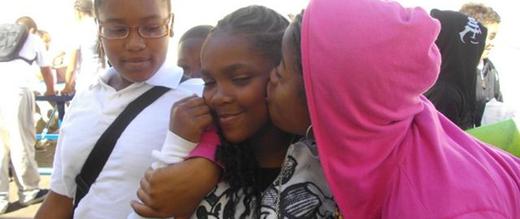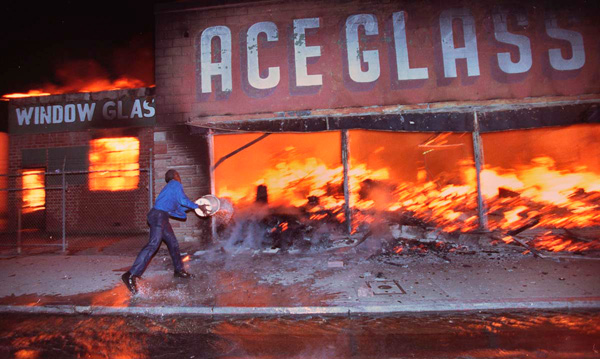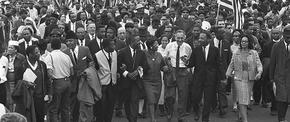The views expressed in our content reflect individual perspectives and do not represent the official views of the Baha'i Faith.
Ten years ago I had the distinct honor of accompanying my remarkable wife Teresa to an awards banquet and ceremony held annually by the County of Los Angeles. We went because her non-profit, Baha’i-inspired organization had just won the John Anson Ford Human Relations award from the County Board of Supervisors and the County’s Human Relations Commission. Then called the Children’s Enrichment Program, and now known as Full-Circle Learning, this growing grassroots educational initiative had been recognized by the County’s elected leadership for making a significant contribution to fostering human relations in Southern California.
Here’s a little of the backstory: Full-Circle Learning started after the civil unrest in Los Angeles in 1992. In fact, the Los Angeles Baha’i Center, near the epicenter of the rioting, almost burned down itself. If you were around during that frightening time, you probably remember Rodney King famously saying “Can’t we all just get along?”
Not surprisingly, this enormous upsurge of anger occurred when a court acquitted the four white policemen who had beaten Rodney King so viciously on camera. Minority communities, fed up with the long-term injustice they faced from what the courts later called “the occupying army” of the historically racist Los Angeles Police Department, exploded in violent fury.
After the physical fires burnt out, Teresa realized, the fires of rage and injustice still smoldered in many hearts. Compassionately concerned with the impact on the children who had seen the looting, the burning and the violence up close, many people began working together to bring groups of kids to the Baha’i Center for a healing after-school program. To make a long story quite short, this occasional volunteer effort morphed into a daily one when the parents learned how much their children needed and wanted it. Teresa wrote a novel about the civil unrest called Nine O’Clock Blue, and inspired by the main character she created, gave up her career as a writer so some of the world’s most vulnerable children would have a chance to lead meaningful lives. Since then, I’m happy to report, Full-Circle Learning has spread around the world, with schools in Asia, Africa and the Americas.
Anyway, as we settled in for the banquet, a priest sat down at our table. We introduced ourselves. I recognized him – Father Gregory Boyle, the Jesuit priest who had devoted his entire life to some of society’s poorest, most feared and most reviled people – gang members. Along with my wife, Father Greg was there to be honored that day. The founder of Homeboy Industries, affectionately known as G-Dog to every gangbanger in the country, Father Greg lived his motto at Homeboy, a jobs program for ex-gangsters: “Only a Job Can Stop a Bullet.” A friendly Irish guy with a white beard and a humble manner, the three of us began to talk. It turned into one of the most profound conversations of my life.
First Teresa and Father Greg traded stories about working in the inner city of Los Angeles. Without repeating their stories, here’s the gist – when you work with the poor and the oppressed, when you attempt to extend yourself and your energies to those who have very little, when you devote your life to the uplifting of the society you live in, you reap incredible rewards. That noble, compassionate work can illumine your soul.
Very few people understand, know or get to experience this secret in this life. Selfless service to others transforms you. It gives you back so much more than you give. You can sense it in the enormous peace and happiness people who selflessly serve others can generate.
That afternoon I saw the same exact light in my wife’s and Father Greg’s eyes. It seemed like they both had received a shining, incomparable gift. They had truly partaken of the grace of God. They had felt the love of those they served come back to them a thousandfold. In other words, they had experienced true service to others, and had become intoxicated with it. Their service, really the giving away of their lives, had changed them both profoundly.
After the awards were awarded and the applause had died down, we walked out with Father Greg and said our fond goodbyes. In the years to come I would see him again, always endeavoring to expand what he does to uplift the fallen. Every time I read this passage from Abdu’l-Baha, I think of my wife and Father Greg and the countless others who lead truly selfless lives:
The Law of God is divided into two parts. One is the fundamental basis which comprises all spiritual things — that is to say, it refers to the spiritual virtues and divine qualities; this does not change nor alter: it is the Holy of Holies, which is the essence of the Law of Adam, Noah, Abraham, Moses, Christ, Muhammad, the Bab, and Baha’u’llah, and which lasts and is established in all the prophetic cycles. It will never be abrogated, for it is spiritual and not material truth; it is faith, knowledge, certitude, justice, piety, righteousness, trustworthiness, love of God, benevolence, purity, detachment, humility, meekness, patience and constancy. It shows mercy to the poor, defends the oppressed, gives to the wretched and uplifts the fallen. – Abdu’l-Baha, Some Answered Questions, p. 47.


















Comments
Sign in or create an account
Continue with Facebookor